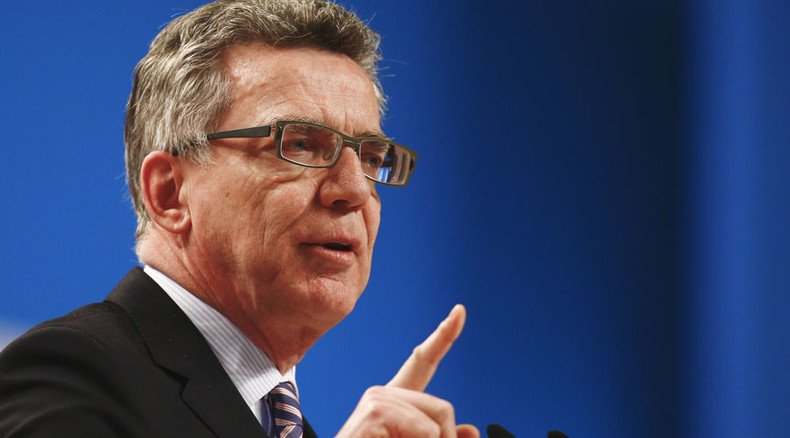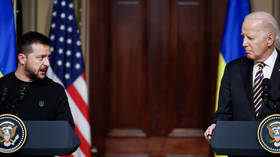Germany advocates cutting funds to put ‘pressure’ on EU states that reject refugee quotas

German Interior Minister Thomas de Maiziere endorsed the idea of cutting funds to those European Union member-states that refuse to accept binding refugee relocation quotas, as a means of exerting pressure.
Thomas de Maiziere expressed his disappointment and sharply criticized the actions of Hungary, the Czech Republic, Slovakia and Romania as well as the Baltic states after the emergency meeting of the European interior ministers in Brussels. On Monday, those states' disapproval resulted in the failure of the plan to distribute 120,000 refugees across the EU.
“Some states apparently believe they bear no responsibility and are under no obligation to participate in the joint response to the current great challenge,” de Maiziere told the German television network ZDF.
Siberia, Auschwitz, Arctic? Europe's extreme solutions to asylum seeker crisis http://t.co/mG0kLMImSPpic.twitter.com/mb3UzUEnnX
— RT (@RT_com) September 15, 2015He called their tactic at the meeting “opportunistic behavior of the minority” and suggested measures to put pressure on them.
"The negotiations situation is such that nothing happens to countries which refuse. We need to talk about ways of exerting pressure. These are often countries that receive a lot of structural funds from the European Union," Thomas de Maiziere in an interview to ZDF.
He also emphasized that he agreed with the suggestion of the European Commission President, Jean-Claude Juncker, who proposed that “we should look at whether these countries [that refuse quotas] should get less structural funds.”
BREAKING: Refugees & migrants stranded in Hungary begin hunger strike http://t.co/qojivtaOEbpic.twitter.com/z67YDjOaY1
— RT (@RT_com) September 15, 2015German interior minister also claimed that the EU states that agreed to host refugees should ask European Council to allow the refugee relocation quotas to be approved by a majority vote to bypass the blocking of the decision by “minority.” He added that the quotas should be binding for those countries that opposed their imposition, as well.
LISTEN MORE:
The ministers at Monday's meeting only agreed on the plan to distribute 40,000 refugees now residing in Greece and Italy over the next two years, which was proposed by the EU Commission in May.
“We have reached a political agreement on distributing 160,000 refugees. However, we have not yet agreed upon the distribution of quotas as well as upon some aspects of the [relocation] mechanism,” Thomas de Maiziere commented on the results of the meeting.
He also said that the final decision was postponed until the next ministerial summit on October 8.
BREAKING: #Austria sends army to border to help with #refugee checks – vice-chancellor http://t.co/8wuZ4x704Apic.twitter.com/OqkpaDvO6a
— RT (@RT_com) September 14, 2015The German interior minister was not the only one dissatisfied with the results of the Monday meeting.
President of the European Parliament Martin Schulz said he was “disappointed” and added that Europe had “absolutely no time,” as quoted by the German newspaper Suddeutsche Zeitung.
“We have not reached the agreement we strived for,” the EU Commissioner on Migration, Home Affairs and Citizenship Dimitris Avramopoulos said
“Most member-states are ready to proceed [with the relocation plan] but not all of them,” he added.
Luxemburg’s Foreign minister, Jean Asselborn, called the conduct of Hungary, the Czech Republic, Poland and Slovakia “a problem” and claimed these countries needed “understanding and encouragement” and the goal was to “count them in,” as quoted by the German n-tv.
Jean Asselborn also stressed that, if Europe failed to resolve the refugee crisis, there would be no Europe any more.
BREAKING: #Germany halts trains coming from Austria - reports http://t.co/NCndsB32EUpic.twitter.com/HCceLRSFku
— RT (@RT_com) September 13, 2015"Europe once again disgraced itself yesterday," German vice chancellor, Sigmar Gabriel, commented on the results of the Monday meeting on Tuesday, as quoted by the German Die Welt.
He also emphasized that “the whole Europe is at stake” and that “the refugee crisis threatens Europe more than the Greek crisis.” He also insisted that every EU country should contribute to the resolution of the crisis situation.
"Germany is not ready to be a net payer country in a Europe where everyone wants to join in when they get money, but are not willing to share the responsibility," he said.
"Our country can't solve the refugee problems of half the world by itself," he added.
LISTEN MORE:












